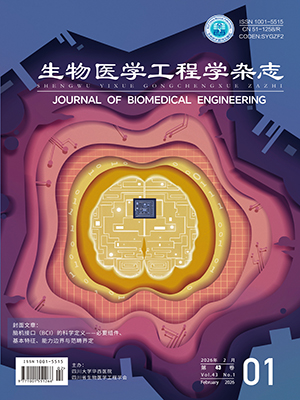| 1. |
尼克·拉姆齐. 脑-计算机接口. 伏云发, 王帆, 丁鹏, 等译. 北京: 国防工业出版社, 2023.
|
| 2. |
Bergeron D, Iorio-Morin C, Bonizzato M, et al. Use of invasive brain-computer interfaces in pediatric neurosurgery: Technical and ethical considerations. J Child Neurol, 2023, 38(3-4): 223-238.
|
| 3. |
伯哈德·格雷曼. 脑-机接口-革命性的人机交互. 伏云发, 郭衍龙, 张夏冰, 等译. 北京: 国防工业出版社, 2020.
|
| 4. |
Wolpaw J R. 脑机接口原理与实践. 伏云发, 杨秋红, 徐宝磊, 等译. 北京: 国防工业出版社, 2017.
|
| 5. |
Vansteensel M J, Klein E, van Thiel G, et al. Towards clinical application of implantable brain–computer interfaces for people with late-stage ALS: medical and ethical considerations. J Neurol, 2023, 270(3): 1323-1336.
|
| 6. |
张喆, 赵旭, 马艺昕, 等. 脑机接口技术伦理规范考量. 生物医学工程学杂志, 2023, 40(2): 358-364.
|
| 7. |
人工智能医疗器械创新合作平台. 脑机接口技术在医疗健康领域应用白皮书. 北京: 人工智能医疗器械创新合作平台, 2023.
|
| 8. |
Klein E, Ojemann J. Informed consent in implantable BCI research: identification of research risks and recommendations for development of best practices. J Neural Eng, 2016, 13(4): 043001.
|
| 9. |
Klein E, Brown T, Sample M, et al. Engineering the brain: ethical issues and the introduction of neural devices. Hastings Cent Rep, 2015, 45(6): 26-35.
|
| 10. |
Vansteensel M J, Branco M P, Leinders S, et al. Methodological recommendations for studies on the daily life implementation of implantable communication-brain–computer interfaces for individuals with locked-in syndrome. Neurorehabil Neural Repair, 2022, 36(10-11): 666-677.
|
| 11. |
Kübler A, Holz E M, Riccio A, et al. The user-centered design as novel perspective for evaluating the usability of BCI-controlled applications. PLoS One, 2014, 9(12): e112392.
|
| 12. |
Jarosiewicz B, Sarma A A, Bacher D, et al. Virtual typing by people with tetraplegia using a self-calibrating intracortical brain-computer interface. Sci Transl Med, 2015, 7(313): 313ra179.
|
| 13. |
Downey J E, Schwed N, Chase S M, et al. Intracortical recording stability in human brain–computer interface users. J Neural Eng, 2018, 15(4): 046016.
|
| 14. |
Milekovic T, Sarma A A, Bacher D, et al. Stable long-term BCI-enabled communication in ALS and locked-in syndrome using LFP signals. J Neurophysiol, 2018, 120(7): 343-360.
|
| 15. |
Perge J A, Zhang S, Malik W Q, et al. Reliability of directional information in unsorted spikes and local field potentials recorded in human motor cortex. J Neural Eng, 2014, 11(4): 046007.
|
| 16. |
Perge J A, Homer M L, Malik W Q, et al. Intra-day signal instabilities affect decoding performance in an intracortical neural interface system. J Neural Eng, 2013, 10(3): 036004.
|
| 17. |
Colachis S C, Dunlap C F, Annetta N V, et al. Long-term intracortical microelectrode array performance in a human: A 5 year retrospective analysis. J Neural Eng, 2021, 18(4): 0460d7.
|
| 18. |
Pels E G M, Aarnoutse E J, Leinders S, et al. Stability of a chronic implanted brain-computer interface in late-stage amyotrophic lateral sclerosis. Clin Neurophysiol, 2019, 130(10): 1798-1803.
|
| 19. |
Willett F R, Kunz E M, Fan C, et al. A high-performance speech neuroprosthesis. Nature, 2023, 620(7976): 1031-1036.
|
| 20. |
Ma Yixin, Gong Anmin, Nan Wenya, et al. Personalized brain–computer interface and its applications. J Pers Med, 2022, 13(1): 2-25.
|
| 21. |
顾心怡, 陈少峰. 脑机接口的伦理问题研究. 科学技术哲学研究, 2021, 38(4): 79-85.
|
| 22. |
Hochberg L R, Bacher D, Jarosiewicz B, et al. Reach and grasp by people with tetraplegia using a neurally controlled robotic arm. Nature, 2012, 485(7398): 372-375.
|
| 23. |
Bacher D, Jarosiewicz B, Masse N Y, et al. Neural point-and-click communication by a person with incomplete locked-in syndrome. Neurorehabil Neural Repair, 2015, 29(5): 462-471.
|
| 24. |
Holz E M, Botrel L, Kaufmann T, et al. Long-term independent brain-computer interface home use improves quality of life of a patient in the locked-in state: a case study. Arch Phys Med Rehab, 2015, 96(3): S16-S26.
|
| 25. |
Humphrey D R, Schmidt E M, Thompson W D. Predicting measures of motor performance from multiple cortical spike trains. Science, 1970, 170(3959): 758-762.
|
| 26. |
Pandarinath C, Nuyujukian P, Blabe C H, et al. High performance communication by people with paralysis using an intracortical brain-computer interface. Elife, 2017, 6: e18554.
|
| 27. |
Willett F R, Avansino D T, Hochberg L R, et al. High-performance brain-to-text communication via handwriting. Nature, 2021, 593(7858): 249-254.
|
| 28. |
Ford P J, Kubu C S. Stimulating debate: ethics in a multidisciplinary functional neurosurgery committee. J Med Ethics, 2006, 32(2): 106-109.
|
| 29. |
Kübler A, Nijboer F, Kleih S. Hearing the needs of clinical users. Handb Clin Neurol, 2020, 168: 353-368.
|
| 30. |
Branco M P, Pels E G M, Sars R H, et al. Brain-computer interfaces for communication: preferences of individuals with locked-in syndrome. Neurorehabil Neural Repair, 2021, 35(3): 267-279.
|
| 31. |
Burwell S, Sample M, Racine E. Ethical aspects of brain computer interfaces: a scoping review. BMC Med Ethics, 2017, 18(1): 1-11.
|
| 32. |
Tamburrini G. Brain to computer communication: Ethical perspectives on interaction models. Neuroethics, 2009, 2: 137-149.
|
| 33. |
Nijboer F, Clausen J, Allison B Z, et al. The asilomar survey: Stakeholders’ opinions on ethical issues related to brain-computer interfacing. Neuroethics, 2013, 6: 541-578.
|
| 34. |
Chan A K, McGovern R A, Brown L T, et al. Disparities in access to deep brain stimulation surgery for Parkinson disease: interaction between African American race and Medicaid use. JAMA Neurol, 2014, 71(3): 291-299.
|
| 35. |
Lázaro-Muñoz G, Yoshor D, Beauchamp M S, et al. Continued access to investigational brain implants. Nat Rev Neurosci, 2018, 19(6): 317-318.
|
| 36. |
Hendriks S, Grady C, Ramos K M, et al. Ethical challenges of risk, informed consent, and posttrial responsibilities in human research with neural devices: a review. JAMA Neurol, 2019, 76(12): 1506-1514.
|
| 37. |
Rossi P J, Giordano J, Okun M S. The problem of funding off-label deep brain stimulation: bait-and-switch tactics and the need for policy reform. JAMA Neurol, 2017, 74(1): 9-10.
|
| 38. |
Thenaisie Y, Palmisano C, Canessa A, et al. Towards adaptive deep brain stimulation: clinical and technical notes on a novel commercial device for chronic brain sensing. J Neural Eng, 2021, 18(4): 042002.
|
| 39. |
王高峰, 张志领. 算法伦理视域下的脑机接口伦理问题研究. 自然辩证法研究, 2022, 38(7): 68-73.
|
| 40. |
Luo Shiyu, Qinwan R, Crone N E. Brain-computer interface: Applications to speech decoding and synthesis to augment communication. Neurotherapeutics, 2022, 19(1): 263-273.
|
| 41. |
董煜阳, 龚安民, 丁鹏, 等. 一种新型结合下肢动觉运动想象和视觉运动想象的脑机接口. 南京大学学报(自然科学), 2022, 58(3): 460-468.
|
| 42. |
Pandarinath C, Bensmaia S J. The science and engineering behind sensitized brain-controlled bionic hands. Physiol Rev, 2021, 102(2): 551-604.
|
| 43. |
Khan M A, Das R, Hansen J P, et al. Brain and behaviour computing. Boca Raton: CRC Press, 2021.
|
| 44. |
艾丽森 B Z, 邓恩 S, 莱布 R., 等. 面向实用的脑-机接口: 缩小研究与实际应用之间的差距. 伏云发, 龚安民, 陈超, 等译. 北京: 电子工业出版社, 2022: 45-47.
|
| 45. |
Vaughan T M. Brain-computer interfaces for people with amyotrophic lateral sclerosis. Handb Clin Neurol, 2020, 168: 33-38.
|
| 46. |
Metzger S L, Littlejohn K T, Silva A B, et al. A high-performance neuroprosthesis for speech decoding and avatar control. Nature, 2023, 620(7976): 1037-1046.
|
| 47. |
Vansteensel M J, Jarosiewicz B. Brain-computer interfaces for communication. Handb Clin Neurol, 2020, 168: 67-85.
|
| 48. |
Mitchell K T, Starr P A. Smart neuromodulation in movement disorders. Handb Clin Neurol, 2020, 168: 153-161.
|
| 49. |
Nakayama Y, Shimizu T, Mochizuki Y, et al. Predictors of impaired communication in amyotrophic lateral sclerosis patients with tracheostomy-invasive ventilation. Amyotroph Lateral Scler Frontotemporal Degener, 2015, 17(1-2): 38-46.
|




